WEYBURN – Maintaining a prescient mindset is one notable and desirable trait to claim in Jacquelene Gibbs’s world. But even she probably couldn’t anticipate the rapid growth in community take up that has involved the South East Cornerstone Public School Division’s Early Learning programming that cares for the youngest members of the SECPSD family.
Newly developed and successful projects have led to more than a doubling of participants in some offerings and the demands they make on the professional personnel are being met with signature talents.
Gibbs was in the Cornerstone conference room on May 22 to explain the process and procedures of this portfolio to an attentive audience of board members and administrators. The group gathering was part of the board’s monthly meeting in the school division’s head office in Weyburn.
Gibbs, is the co-ordinator of the early learning system in Cornerstone. Nine other professionals who deal with various programming needs and other staff members, keep the projects and programs moving ahead. Those needs are brought to the table early on in a child’s worldly adventures and continue up to the age of five, as the youngsters are then prepared to take on the grade level classes.
Gibbs noted the provincial priorities of learning and assessment along with Indigenous education programs are embraced by SECPSD. That includes focus of pedagogical instructional coaches to support Tier One instruction for teachers across the grades.
Instructional coaching, especially for newly arrived educators, is one peg in the program along with the Indigenous educators programming, mathematics and English as an additional language. They all have specific coaching leaders at the helm.
She noted the portfolio contains two overarching pieces. These pieces are the new teacher and instructional supports from pre-Kindergarten to Grade 12 and the birth to five early learning programs that support the provincial priorities and assessment.
The connection begins long before the child comes to school and other sites can be used such as libraries, or, as she suggested, a program held in a rink, as a possible venue.
As in other Cornerstone realms, programming is data driven and Gibbs brought those facts to the table along with examples of strategies deployed to assist both the young participants and their valued educators. She noted how new teachers are brought on board and connected to coaches and other supports as they begin their careers in SECPSD.
There has been a reduction in personnel she noted but they are handling the increases in demands and enrolments.
“Teachers can go on site to refine their practises and administrators know what to look for when they enter,” Gibbs said. That way they get a clear picture and teacher decisions are made a bit easier. She noted the coaches assigned are just that. The teachers make the decisions, the coaches “stay on the sidelines” after providing their assistance. New teachers got most of their focus this year, Gibbs said.
There were five new teacher orientation sessions delivered this school year followed by survey/data collection as the coaches followed up on their duties.
Director of Education, Keith Keating added that district superintendents follow up as well to ensure nothing is missed.
New teachers, in other words, can rest assured that a coach is there to help them.
Indigenous education programming involves treaty outcomes and educational experiences for the youngest.
Gibbs spent some time in her half-hour presentation to explain such things as the Master Minds program that has gained popularity for families and how the youngest enrolees learn through play and how their progress is documented and how families are engaged in the discussions over the learning experiences and how the young kids get engaged with one another as they travel through the program(s).
The Estevan Early Years Family Resource Centre is brimming with activities and participants with the families that have registered in the past month now exceeding 507 compared with just 24 at the start of the new program launch in May of 2021.
The Drop In Family Free Play program at the Estevan centre nearly reached the 2,600 mark in March. Gibbs noted this program could double in size if they had the space to do so. She said that some programming participants are able to “spill out” into the nearby field and an outdoor play area is being developed.
Early learning programming also includes mobile outreach adventures in a number of communities and regions.
The support system includes home visits, information referrals and transition supports.
The pre-Kindergarten program continues to grow too with increases in regular attendance as the youngsters learn through play and experiences with their adult educators and other children.
Gibbs later returned to the presentation table along with Tracey Kiliwnik, the co-ordinator of Learning Supports and Cheryl Anderson, co-ordinator of Student Services to talk about Cornerstone’s System Goal 4 that calls for the division to strengthen and maintain two-way communication with internal and external stakeholders.





